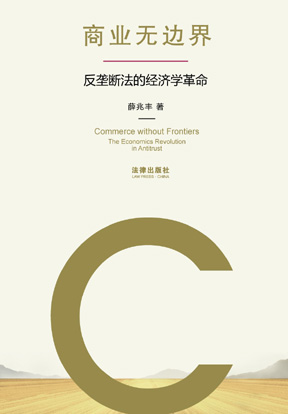商业无边界——反垄断法的经济学革命
[薛兆丰新书序言] 本书对中国经济具有重大的价值。这本书指出了美国式(而且更多是欧洲式)反垄断法的种种圈套和谬误,而这种反垄断法正在被许多国家所生搬硬套。只要读完这本著作,你就会奇怪在经济科学当道的年代竟然还有反垄断法这种错漏百出的东西,而且还会惊叹其它国家竟然还会对这趟混水趋之若鹜。
这本书将掀掉读者头上的蒙眼布,把错误最初是怎么产生的、以及它们为什么至今还挥之不去解释得一清二楚。任何一个走完这个思想历程的人,都会深深地怀疑反垄断法究竟对社会有什么好处。但是,即使政策制定者出于其自身的原因执迷不悟和一意孤行,我们也至少知道该如何缓解其决策的恶劣效果了。
—— 亨利·曼尼(Henry Manne)
乔治·梅森大学法学院荣休院长
内容简介
图书信息
书名:商业无边界——反垄断法的经济学革命
作者:薛兆丰
策划编辑:陈斌
责任编辑:韩满春
出版社:法律出版社
出版日期:2008年11月1日
ISBN:978-7-5036-8782-2
发行:中国法律图书有限公司
销售:全国新华书店及网络书店
定价:20.00元
网上购买
请点击这里在“牛博淘宝网”购买签名版本
请点击这里在“当当书店”以85%折优惠价购买
请点击这里在“中国图书网”以85%折优惠价购买
点击这里在“卓越书店”以85%折优惠价购买
作者简介
薛兆丰,经济学者,美国西北大学法学院(Northwestern University School of Law)博士后研究员,北京大学“法律经济学研究中心”研究员,美国乔治·梅森大学(George Mason University)经济学博士。曾在梅森大学讲授“法与经济学”课程,并在国内发表过数百篇经济评论和文章,持续影响了读者对市场经济的认识。2002 年出版《经济学的争议》,2006 年被《南方人物周刊》评为中国十大青年领袖。
序言
亨利·曼尼(Henry G. Manne)*
乔治·梅森大学法学院荣休院长
薛兆丰博士写的这本书对中国经济具有重大的价值。简单地说,这本书指出了美国式(而且更多是欧洲式)反垄断法的种种圈套和谬误,而这种反垄断法正在被许多国家所生搬硬套。只要读完这本著作,你就会奇怪在经济科学当道的年代竟然还有反垄断法这种错漏百出的东西,而且还会惊叹其它国家竟然还会对这趟混水趋之若鹜。
兆丰的第一项工作,就是阐释为什么一系列的现象——诸如企业扩大规模、锁定转售价格、企业纵向整合、低于成本定价、价格歧视和多种类型的合并——其实都是促进竞争和有益经济的行为。不幸的是,用来解释这些好处的这些强有力的经济逻辑,以前并不总是被人理解。美国的反垄断法始于1890年,但兆丰所介绍的这些令人折服的解释,许多是到了20世纪后半叶才逐渐在经济学研究中成形的;而尽管美国的法院在过去这些年里已经开始重塑反垄断法,以求体现这些新知识,但其他国家的法院和管制者却似乎要让智力的时钟定格在1950年附近,而那恰恰是反垄断思维荒诞不经的高峰期。
所以尽管这几十年来,通过竞争性的市场来追求社会福利最大化的思想,已经渗透到政治和经济思辨的每个角落,但与时代格格不入的反垄断思维,却在每一个声称要发挥市场经济的最大效用的国家里大行其道。兆丰在解释这一现象时,最大限度地运用了对经济问题进行跨学科研究的成果。
这个现象的第一个根源,也是经常被低估的根源,就是经济学无知。政策制定者(以及他们的拥趸)根本就不知道自己在干什么。否则,他们就应该更钟情于1950年代后的反垄断司法实践,而不是1950年代前的理论。为了细述经济学新知的重要性,兆丰详细介绍了在美国法学院以“法与经济学”驰名的学术运动的演变历程。那是一场意义深远的学术进步。这个领域的研究不仅影响了法学教授和经济学家,而且还对美国联邦法庭的法官产生了深刻的影响,而大部分的反垄断实践就是在联邦法庭里进行的。对政策制定者进行教育的活动,其重要性怎么强调也不过分,因为如果缺少了这些新知,反垄断的图景里就不可能出现深刻的改进。
但是,用“无知”来进行解释,存在一个重大的缺陷,即它无法解释政客和管制者为什么恰恰在这个问题上而不是别的问题上犯傻。于是,兆丰闯入了一个在反垄断学术圈内罕有人谈及的领域,而这个领域对解释反垄断世界里的许多现象是至关重要的,那就是公共选择理论的领域。这个领域的主题,即“对政治行为作经济学分析”,本身就属于新近的研究成果,虽然它的框架已经越来越形式化和趋于完整了。现在,通过运用经济分析的工具,进一步深化对现代美国反垄断的理解,我们开始知道政客和管制者的个人利益如何符合逻辑地(尽管这对社会是不利的)驱使他们倾向于老式的反垄断政策。
这本书将掀掉读者头上的蒙眼布,把错误最初是怎么产生的、以及它们为什么至今还挥之不去解释得一清二楚。任何一个走完这个思想历程的人,都会深深地怀疑反垄断法究竟对社会有什么好处。但是,即使政策制定者出于其自身的原因执迷不悟和一意孤行,我们也至少知道该如何缓解其决策的恶劣效果了。
* 注:亨利·曼尼(Henry G. Manne)是美国“法与经济学”领域的创始人之一。他在1965年提出的“公司控制权市场理论(the theory of a market of corporate control)”开创了公司法的经济学研究,在1966年出版的《内部交易与股票市场(Insider Trading and the Stock Market)》至今仍是美国证券交易业内的讨论热点。曼尼于1952年在芝加哥大学取得法学博士(J.D.)学位。他创建的首个“法与经济学中心”(现位于乔治·梅森大学校内)曾经向大量法学教授和联邦法官提供过经济学分析的训练。曼尼现在是梅森大学法学院的荣休院长。
Foreword by Henry G. Manne
Dr. Zhaofeng Xue has written a book of enormous value to the Chinese economy. It is, in a word, a guidebook to the many traps and fallacies of American-style (and, even more, European-style) antitrust law that is being adopted willy-nilly in many countries. One cannot read or peruse this monograph without becoming completely puzzled about how such a plethora of errors could exist in this era of scientific economics and startled by the attractiveness of this muddle for other countries.
Dr. Xue’s first task then is to demonstrate why such phenomena as large-scale firms, resale price maintenance, vertical integration, below-cost pricing, price discrimination and many kinds of mergers are pro-competitive, economically beneficial practices. The strong economic logic which now explains these benefits was not, however, always understood. American antitrust laws date from 1890, while many of the convincing explanations Dr. Xue offers were not developed in the economics literature until the second-half of the 20th Century. And while American courts have for some years now reshaped antitrust law to reflect this newer understanding, other nations’ courts and regulators seem to want to stop the intellectual clock at about 1950, the highpoint of fallacious antitrust reasoning.
So even though the idea of competitive markets as maximizing social welfare has made significant inroads on political and economic thinking everywhere in recent decades, anachronistic antitrust thinking prevails in the very countries that allegedly want to adopt the best of market economics. Dr. Xue’s explanation of this phenomenon is reflective of the best in interdisciplinary thinking about economic problems.
The first and often oversimplified part of this explanation has to do with economic literacy. The policy makers (and their audiences) simply do not really understand what they are doing, since, if they did, they would be more enamored of post-1950 American antitrust jurisprudence than they are with pre-1950 ideas. To elaborate the significance of the newer learning, Dr. Xue details the development of the field known in American law schools as “Law and Economics,” an intellectual advancement of major significance. This area of study has not only influenced law professors and economists, it has had a profound influence on the judges in America’s federal courts, the locus of most antitrust jurisprudence. The importance of active educational programs for policy makers cannot be overemphasized, for without this understanding, there can be no profound improvement in the antitrust picture.
But the argument from ignorance has a major flaw; it cannot explain why this particular form of economic foolishness was selected over all the others that are available to politicians and regulators. And so Dr. Xue makes an incursion into an area rarely discussed in antitrust circles but absolutely crucial to an understanding of what is going on in many parts of the antitrust world, the field of public choice theory. This subject, the “economics analysis of political behavior,” is, in its more formalized and integrated form, also of recent vintage. Now, using the kinds of tools of economic analysis that fathered the modern antitrust understanding in America, we can begin to understand how the interests of politicians and regulators may logically (but not socially desirably) tend them in the direction of old-style antitrust.
This book will lift a veil off the readers’ eyes, as it becomes perfectly understandable how mistakes were originally made and why they persist in some parts of the world today. No one can come through this exercise without expressing strong doubts about whether antitrust is socially desirable. But if, for reasons of their own, policy makers persist in this nonsense, at least we know what to do to ameliorate the worst effects of their decisions.
Henry G. Manne
Dean Emeritus
George Mason University School of Law





 布坎南(James M. Buchanan):需求量和价格之间的反向关系,是经济科学的核心命题,它体现了这样的预设,即人类的选择行为足够理性,以致是可以预测的。没有一个物理学家会说“水往上流”,也没有一个自重的经济学家会说“提高最低工资可以增加就业”。这种说法,要是认真地生发下去,将无异于全盘否定了经济学,使其科学含义荡然无存;要是这样,经济学家除了撰写迎合意识形态偏好的文章,就别无可为了。值得庆幸的是,只有一小撮经济学家愿意背弃两个世纪的经济学教诲;我们尚未堕落成一群随营的娼妓(详见
布坎南(James M. Buchanan):需求量和价格之间的反向关系,是经济科学的核心命题,它体现了这样的预设,即人类的选择行为足够理性,以致是可以预测的。没有一个物理学家会说“水往上流”,也没有一个自重的经济学家会说“提高最低工资可以增加就业”。这种说法,要是认真地生发下去,将无异于全盘否定了经济学,使其科学含义荡然无存;要是这样,经济学家除了撰写迎合意识形态偏好的文章,就别无可为了。值得庆幸的是,只有一小撮经济学家愿意背弃两个世纪的经济学教诲;我们尚未堕落成一群随营的娼妓(详见


给作者留言(不公开):